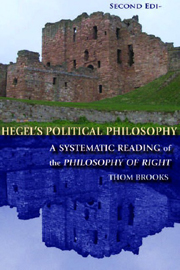7 - Monarchy
Published online by Cambridge University Press: 12 September 2012
Summary
Introduction
Perhaps one of the most controversial aspects of G. W. F. Hegel's Philosophy of Right for contemporary interpreters is its discussion of the constitutional monarch [der konstitutionell Monarch]. This is true despite the general agreement amongst virtually all interpreters that Hegel's monarch is no more powerful than modern constitutional monarchies, such as those found in Britain. This common view has only recently come into vogue, as Hegel's monarch had long been seen as evidence of Hegel's defence of the reactionary Prussian authority of his time. The view of Hegel as a reactionary was put forward most forcefully (and famously) by Karl Popper in his The Open Society and Its Enemies. He not only claimed that Hegel was ‘an apologist for Prussian absolutism’, but that Hegel is the father of modern totalitarianism. This reading of Hegel has now been discredited, due in large part to the work of T. M. Knox, and not least because of various liberal characteristics of the state that Hegel defends which were not features of the Prussia of his time, such as the use of jury trials and representative institutions, as well as the eligibility of all citizens for civil service.
Despite this general agreement, many commentators find Hegel's defence of the constitutional monarch a great weakness in his account of the state, calling it ‘arbitrary’, ‘beset with contradictions’, ‘bizarre’, ‘comical’, ‘implausible’, ‘obscure’, ‘troubling’, ‘unconvincing’, ‘unusual’, ‘wide of the mark’, and even worse.
- Type
- Chapter
- Information
- Hegel's Political PhilosophyA Systematic Reading of the Philosophy of Right, pp. 96 - 113Publisher: Edinburgh University PressPrint publication year: 2009



